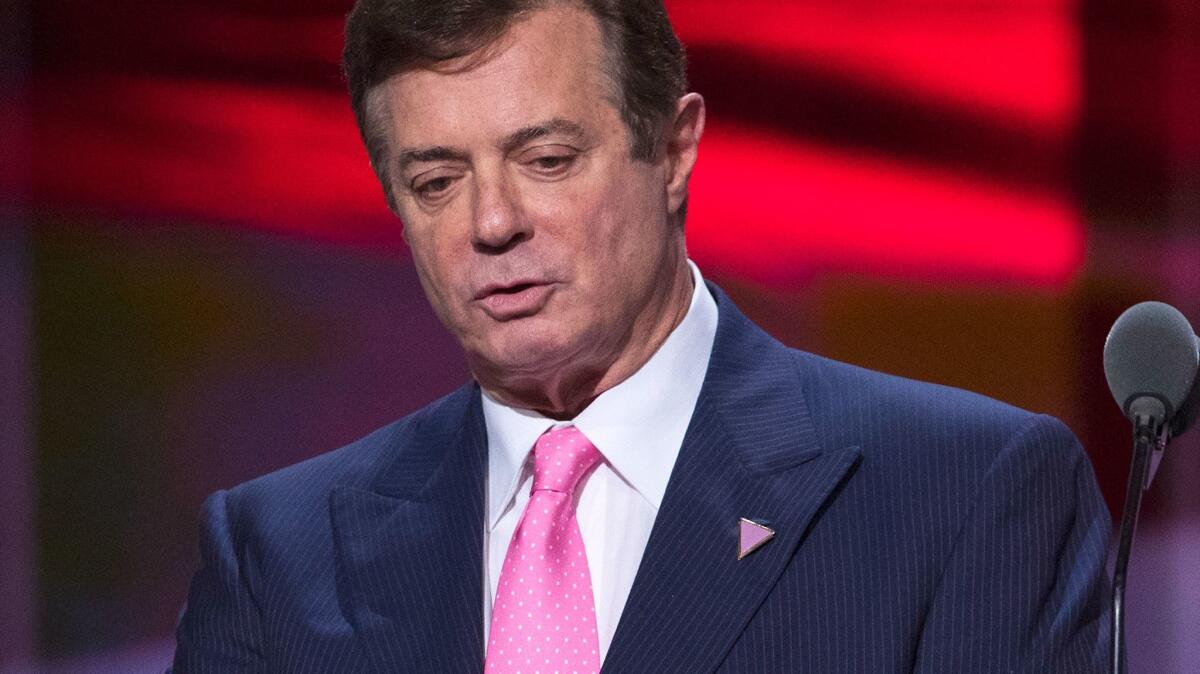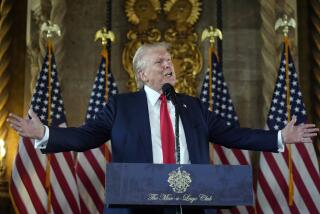White House pushes a two-front defense: Blaming indicted aides and Hillary Clinton

- Share via
Reporting from Washington — His presidency facing fresh peril, President Trump and his loyalists have adopted a twofold strategy to protect him against the indictment of two senior campaign aides and a guilty plea on the part of a third, more junior aide: distancing Trump from alleged wrongdoers and leveling new attacks on an old nemesis, Hillary Clinton.
Shortly after the announcement that indictments had been issued for former Trump campaign manager Paul Manafort and Manafort’s long-term colleague Rick Gates, Trump outlined his strategy succinctly, if not entirely accurately.
“Sorry, but this is years ago, before Paul Manafort was part of the Trump campaign. But why aren’t Crooked Hillary and the Dems the focus?????” he wrote on Twitter.
“Also, there is NO COLLUSION!”
Monday’s indictments opened a new phase of the investigation headed by special counsel Robert S. Mueller III. For the first time, the case has shifted from generalized accusations to specific charges against named individuals.
What neither the president’s backers nor his opponents know for sure is how many Americans in this highly polarized political era may still be out there who have withheld judgment until now and how they may be affected by the sight on their televisions of men in suits walking into court to enter criminal pleas.
Anna Greenberg, a Democratic pollster who has conducted surveys in contested congressional districts, said many voters have been awaiting the outcome of the investigation before judging Trump.
“I think that this is a real issue for him, despite the divisions in our country,” she said. “This is clearly the beginning of finding out what happened.”
Some Trump supporters, however, discounted that, saying the absence of any charges directly against Trump will minimize the impact.
“They’ve gotten some fringe players … but there’s still no smoking gun as to Russian collusion,” former Trump campaign advisor Barry Bennett said.
The White House sought to emphasize that point as much as possible Monday.
In a briefing, Press Secretary Sarah Huckabee Sanders offered no defense of Manafort, who ran the president’s campaign for key months last year and wrangled delegates to ensure Trump’s nomination at the Republican National Convention in July.
Instead, she pointed repeatedly to the fact that the charges in the indictments focused on activities that largely took place before Manafort and Gates joined the campaign — although despite Trump’s tweeted assertion, the financial crimes alleged in Manafort’s case did extend into his time as campaign manager and beyond.
“Look, today’s announcement has nothing to do with the president, has nothing to do with the president’s campaign or campaign activity,” Sanders said.
She used the same sentiments to distance Trump from George Papadopoulos, the Trump campaign foreign policy aide whose guilty plea was made public Monday.
The charges to which he pleaded guilty — false statements to FBI investigators — have “nothing to do with the activities of the campaign. It has to do with his failure to tell the truth,” Sanders said. She said Trump had reacted to the indictments “the same way the rest of us in the White House have, and that’s without a lot of reaction because it doesn’t have anything to do with us.”
Sanders also said “the real collusion” was between Clinton and Russians who sought to “smear the president.” She was referring to the Clinton campaign’s financing of opposition research that a former British intelligence officer collected on Trump’s alleged involvement with Russians. The Republican argument is that because the dossier Christopher Steele produced included information from some Russian sources, it showed collusion by Clinton.
U.S. intelligence officials have concluded that Russia was working against Clinton in the election, and the Papadopoulos plea agreement includes fresh examples of people tied to the Russian government seeking to deliver information about Clinton to the Trump team.
The White House arguments were amplified by conservative news outlets, including Fox News’ opinion programs, which the president regularly watches. Multiple Fox hosts on Monday called into question Mueller’s integrity and cited the Clinton campaign’s involvement in the dossier.
“What we see in politics now is that you win by any means necessary,” said Lisa Kennedy Montgomery of the Fox show “Outnumbered.” Other guests debated what one called increased questions about Mueller’s “conflicts of interest” and referred to a largely debunked claim that Clinton had sold uranium to Russia.
The conflicting narrative lines speak to the deep political divisions in America that will inevitably shape public reaction to the indictments and any further legal actions by Mueller.
The Trump strategy has been long in the making, since a Manafort indictment has been signaled as early as last summer, when FBI agents used a search warrant to enter his home before dawn.
In August, the day after that search, Trump told reporters that “he was with the campaign, as you know, for a very short period of time — relatively short period of time. But I’ve always known him to be a good man.”
For even longer than that, Trump has used allegations of misconduct by Clinton as a tool for uniting Republicans who disdain the former secretary of State. For days, he and other Republicans have called for investigations of her presidential campaign and State Department tenure. The increased volume of those calls last week may have suggested that Trump and his advisors sensed a looming need for diversion.
By bringing Clinton up once again Monday, Trump was framing the indictments as just another battle in continuing partisan wars. In so doing he was leaning on a political truth: Supporters typically rally around a president in crisis, at least initially.
Democrats initially defended Bill Clinton when his affair with an intern became public, and most remained politically loyal even in the throes of impeachment, in which they saw Republicans trying to drive him from office as a greater threat.
During the Watergate scandal in the 1970s, Republican leaders ultimately convinced President Nixon that he needed to resign, but the party and its voters continued to support him for most of the two-year saga.
Almost 7 in 10 Americans supported Nixon at his second inauguration in 1973, seven months after the bungled effort to bug Democratic headquarters that launched the scandal. Only when White House tape recordings showed Nixon had lied about coordinating a cover-up did a majority of Americans say he should be removed from office. Even then, 1 in 4 Americans opposed his departure.
Trump, however, has far less distance to slide. An NBC News/Wall Street Journal poll released Monday found that even in advance of Monday’s charges, only 38% of Americans approved of how Trump was doing his job, the lowest level yet hit in the poll.
For more on politics from Cathleen Decker »
Twitter: @cathleendecker
ALSO
Indicted aide sought major role in Trump campaign, offered to broker Putin meeting
Updates on California politics
More to Read
Get the L.A. Times Politics newsletter
Deeply reported insights into legislation, politics and policy from Sacramento, Washington and beyond. In your inbox three times per week.
You may occasionally receive promotional content from the Los Angeles Times.











